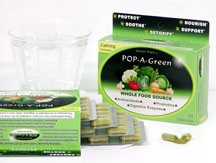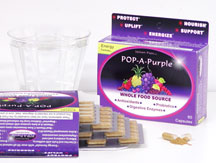 |  |
From the newspaper article:
"Vitamins taken by around a third of the population do not extend life and may even cause premature death, according to a respected group of international scientists.We were as stunned as anyone else at the timing and impact of this huge report.
"After reviewing 67 studies involving more than 230,000 men and women, the experts say there is no convincing evidence that taking supplements of the antioxidant vitamins A, C and E can make you healthier."
As you know from the "Are Your Vitamins Safe?" report, this is only the most recent in a growing number of studies finding that synthetic vitamins (either from a lab beaker or isolated from a plant or animal) are worthless or even risky for a significant number of people. How can this be?
Here's a big reason:
These isolated synthetic vitamins are not absorbed and utilized properly by the body.That's because - the 'main vitamin' ingredient, (e.g. A, E, C, etc.) which is extracted by synthetic vitamin makers, does not include the chemical cousins and other ingredients that main vitamin comes with in its natural form. Apparently, the body needs these "cofactors" to absorb the main vitamin.
It's cheaper to extract just the main vitamin. Only it appears now that the resulting synthetic vitamins are useless or worse.
What's the alternative?
Today there is a new class of multis, whole food multis. They put the whole food in the supplement (minus water and fiber), rather than just the isolated main vitamin or mineral.
Order the Pops Here
Vitamin Scare
Your daily vitamin might not be the insurance you think it is.Are you aware of big vitamin scare going around the US and UK? The staid Reader's Digest even had a cover story, "The Vitamin Hoax: 10 not to take" Feb., 2007).
Worst case: some vitamins are harmful. Best case: they do, well, nothing. So says the Reader's Digest.Before you pop that next daily multi, check the bottle for two things:
1. Toxic ingredients.That's the reason Dr. Heidi finally designed a daily whole food multi, the Pops.
Artificial colors: FD&C Blue #2 Lake, FD&C Red 40, etc.
Preservatives: sorbates (eg, Polysorbate 80), benzoates (eg, sodium benzoate), nitrites (eg, sodium nitrite), sulphites (eg, sulphur dioxide)
2. Are they synthetic?
Look at the names of the vitamins and minerals in the “Ingredients” listing on the label of the bottle. (You may need a magnifying glass.) A vitamin or mineral is synthetic if only its chemical and/or popular name appears, with no plant source.E.g. from the label of a popular synthetic multivitamin seen on TV
Ingredients: Calcium Carbonate, Calcium Phosphate, Magnesium Oxide, Potassium Chloride, Ascorbic Acid (Vitamin C), DL-tocopheryl acetate (Vitamin E), ALL SYNTHETIC vitamins.
Your vitamins are not synthetic if they are listed with their whole food source. For example, “Vitamin C (from camucamu fruit)” indicates that you’re getting the Vitamin C, along with the other nutrients it lives with in the whole fruit. Not just the isolated vitamin C made in a lab.
If you want a daily multi that is whole-food based, with no toxins or synthetic vitamins, go here and get some. They're not a drug, so give them a few months to test them.Regardless of whether you get the whole food multis designed by Dr. Heidi or not (I've taken them for three years) please throw out any synthetic vitamins that might be doing you more harm than good.
If you HATE to pay shipping like I do, check the 4 month (4 boxes) "subscription" option, and you don't pay shipping.

Are the main ingredients synthetic?
They are synthetic if:
Under "Ingredients", only the name of the vitamin or mineral appears,
with or without its chemical name. For example, "Vitamin C", or
"Ascorbic acid (Vitamin C)", or "Calcium Carbonate". Versus “Vitamin C
(from camucamu fruit)” which gives the plant source of natural Vitamin
C.
Does it contain other synthetic ingredients or additives?
Artificial Colors: FD&C Blue #2 Lake, or FD&C Red 40, etc.
Synthetic Preservatives: benzoates (eg sodium benzoate), nitrites (eg
sodium nitrite), sulphites (eg sulphur dioxide), sorbates (eg,
potassium sorbate), etc. Additives: Dextrose, sucrose, starch, etc.
If it’s not a fiber supplement, does it contain added fiber?
Fiber terms: bran, glucomannan, cellulose, pulp
If your answer is Yes to one or more of the questions, you may be wasting
your money, risking your health, or both.
Are Your Vitamins Safe? You ever heard the old joke that Americans have the most expensive pee on the planet? Well that's because it's filled with those vitamins everybody thought were working in their body. If you take vitamins, congratulations. You know you need some kind of daily supplement to help your diet. That's the good news. Here's the bad news: They might not be doing anything for you. They might even be harming you. How do I know? Researchers have now discovered that most vitamins do zip or worse because they're synthetic. How would you know if you are eating synthetic vitamins? I promise you they don't advertise it. Do this: Pull out your bottle of daily vitamins. Look at the label (if you're like me you'll need the magnifier). Check and see if you see any of these synthetic ingredients on the label: Vitamin C or Ascorbic Aciddl-tocopheryl acetate (Vitamin E) Calcium or Calcium Carbonate Titanium Dioxide Sucralose or glucose or some other form of sugar (These are just a few of the synthetic ingredients in 90% of your standard issue vitamins (from Wal-Mart, GNC, etc.) Many more are listed in the free special report, Are You Wasting Your Money on Synthetic Vitamins? And as to possible harm? Well, in medical studies, patients' use of synthetic Vitamin E, for example, resulted in increased rates of lung cancer, heart attacks and death. Yikes. That and worse is also in the free report below. There's a new class of daily multis that have been created to solve this problem. You can learn about those, also. Ready?

